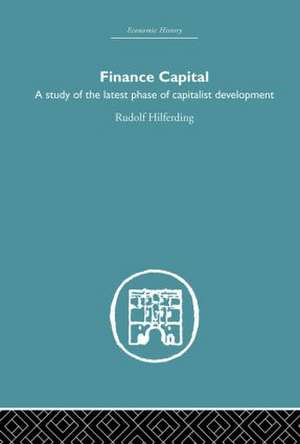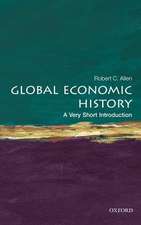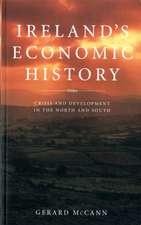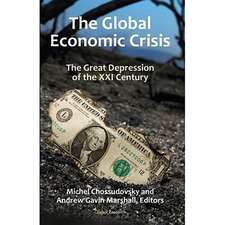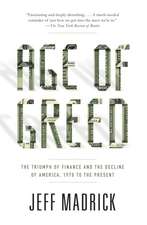Finance Capital: A study in the latest phase of capitalist development: Economic History
Autor Rudolph Hilferdingen Limba Engleză Hardback – 3 noi 2005
But Hilferding’s work was much more than a study of imperialism, which was presented only in the last section of the book. It set out to examine the main tendencies in the development of the capitalist mode of production as a whole at the beginning of the twentieth century, beginning with an exposition of the theory of money (in which particular attention was paid to the growth of credit money), then analysing the increasingly important role of the banks in the mobilization of capital, along with the development of large corporations, cartels and trusts, and finally outlining a theory of economic crises.
Hilferding’s book has, however, more than an historical interest. It is a model for any renewed attempt to understand the ‘latest phase of capitalist development’ in the closing decades of the twentieth century, and Hilferdin’s ideas still provide essential elements for the elaboration of theoretically enlightened and realistic policies in the socialist movement.
| Toate formatele și edițiile | Preț | Express |
|---|---|---|
| Paperback (1) | 507.38 lei 43-57 zile | |
| Taylor & Francis – 16 mar 2007 | 507.38 lei 43-57 zile | |
| Hardback (1) | 1049.88 lei 43-57 zile | |
| Taylor & Francis – 3 noi 2005 | 1049.88 lei 43-57 zile |
Din seria Economic History
- 35%
 Preț: 1050.05 lei
Preț: 1050.05 lei - 36%
 Preț: 1043.40 lei
Preț: 1043.40 lei - 34%
 Preț: 1045.74 lei
Preț: 1045.74 lei - 35%
 Preț: 1058.15 lei
Preț: 1058.15 lei - 34%
 Preț: 1045.01 lei
Preț: 1045.01 lei - 35%
 Preț: 1050.42 lei
Preț: 1050.42 lei - 34%
 Preț: 1049.52 lei
Preț: 1049.52 lei - 34%
 Preț: 1186.90 lei
Preț: 1186.90 lei - 25%
 Preț: 359.11 lei
Preț: 359.11 lei - 34%
 Preț: 1045.01 lei
Preț: 1045.01 lei - 34%
 Preț: 1046.82 lei
Preț: 1046.82 lei - 35%
 Preț: 1050.42 lei
Preț: 1050.42 lei - 36%
 Preț: 1046.09 lei
Preț: 1046.09 lei - 36%
 Preț: 1044.12 lei
Preț: 1044.12 lei - 35%
 Preț: 1050.05 lei
Preț: 1050.05 lei - 21%
 Preț: 357.87 lei
Preț: 357.87 lei - 36%
 Preț: 1046.09 lei
Preț: 1046.09 lei - 34%
 Preț: 1044.68 lei
Preț: 1044.68 lei - 38%
 Preț: 766.66 lei
Preț: 766.66 lei - 34%
 Preț: 1044.68 lei
Preț: 1044.68 lei - 35%
 Preț: 1047.35 lei
Preț: 1047.35 lei - 36%
 Preț: 1044.68 lei
Preț: 1044.68 lei - 54%
 Preț: 709.75 lei
Preț: 709.75 lei - 34%
 Preț: 711.55 lei
Preț: 711.55 lei - 34%
 Preț: 1052.22 lei
Preț: 1052.22 lei - 36%
 Preț: 1045.01 lei
Preț: 1045.01 lei - 34%
 Preț: 1044.48 lei
Preț: 1044.48 lei - 34%
 Preț: 1047.90 lei
Preț: 1047.90 lei - 34%
 Preț: 1047.90 lei
Preț: 1047.90 lei - 22%
 Preț: 355.15 lei
Preț: 355.15 lei - 54%
 Preț: 708.69 lei
Preț: 708.69 lei - 36%
 Preț: 1045.74 lei
Preț: 1045.74 lei - 34%
 Preț: 1044.12 lei
Preț: 1044.12 lei - 36%
 Preț: 1047.19 lei
Preț: 1047.19 lei - 35%
 Preț: 1055.64 lei
Preț: 1055.64 lei - 34%
 Preț: 1049.88 lei
Preț: 1049.88 lei - 34%
 Preț: 1045.57 lei
Preț: 1045.57 lei - 34%
 Preț: 1051.86 lei
Preț: 1051.86 lei - 54%
 Preț: 709.75 lei
Preț: 709.75 lei - 54%
 Preț: 714.80 lei
Preț: 714.80 lei - 34%
 Preț: 1045.01 lei
Preț: 1045.01 lei - 34%
 Preț: 712.09 lei
Preț: 712.09 lei - 35%
 Preț: 1049.88 lei
Preț: 1049.88 lei - 36%
 Preț: 1046.82 lei
Preț: 1046.82 lei - 36%
 Preț: 1044.84 lei
Preț: 1044.84 lei - 36%
 Preț: 1043.05 lei
Preț: 1043.05 lei - 34%
 Preț: 1043.76 lei
Preț: 1043.76 lei - 34%
 Preț: 1049.52 lei
Preț: 1049.52 lei - 34%
 Preț: 1049.88 lei
Preț: 1049.88 lei - 34%
 Preț: 1043.95 lei
Preț: 1043.95 lei
Preț: 1049.88 lei
Preț vechi: 1582.80 lei
-34% Nou
200.92€ • 208.99$ • 165.87£
Carte tipărită la comandă
Livrare economică 14-28 aprilie
Specificații
ISBN-10: 0415379288
Pagini: 480
Dimensiuni: 156 x 234 x 33 mm
Greutate: 0.86 kg
Ediția:1
Editura: Taylor & Francis
Colecția Routledge
Seria Economic History
Locul publicării:Oxford, United Kingdom
Cuprins
Descriere
This is the first English translation of one of the classical works of Marxist economic theory. When Rudolf Hilferding’s Finance Capital was first published in 1919 it was acclaimed by reviewers as a continuation of Marx’s Capital, and it has a major influence upon subsequent Marxist thought, especially in the analysis of imperialism where it provided some of the fundamental ideas for the theories of Bukharin and Lenin.
But Hilferding’s work was much more than a study of imperialism, which was presented only in the last section of the book. It set out to examine the main tendencies in the development of the capitalist mode of production as a whole at the beginning of the twentieth century, beginning with an exposition of the theory of money (in which particular attention was paid to the growth of credit money), then analysing the increasingly important role of the banks in the mobilization of capital, along with the development of large corporations, cartels and trusts, and finally outlining a theory of economic crises.
Hilferding’s book has, however, more than an historical interest. It is a model for any renewed attempt to understand the ‘latest phase of capitalist development’ in the closing decades of the twentieth century, and Hilferdin’s ideas still provide essential elements for the elaboration of theoretically enlightened and realistic policies in the socialist movement.
